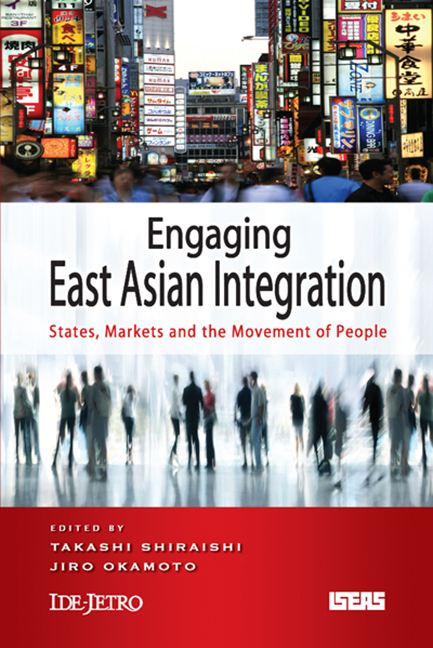Book contents
- Frontmatter
- Contents
- Foreword
- List of Figures and Tables
- Contributors
- 1 Introduction
- Part I EVOLUTION OF EAST ASIAN INTEGRATION
- Part II STATES, MARKETS AND THE MOVEMENT OF PEOPLE
- 4 Economic Integration in East Asia and Japan's Strategy
- 5 The Nature of East Asian Integration and Australia's Engagement
- 6 The Migration of Professionals in an Integrating East Asia
- 7 Panel Discussion
- Index
6 - The Migration of Professionals in an Integrating East Asia
from Part II - STATES, MARKETS AND THE MOVEMENT OF PEOPLE
Published online by Cambridge University Press: 21 October 2015
- Frontmatter
- Contents
- Foreword
- List of Figures and Tables
- Contributors
- 1 Introduction
- Part I EVOLUTION OF EAST ASIAN INTEGRATION
- Part II STATES, MARKETS AND THE MOVEMENT OF PEOPLE
- 4 Economic Integration in East Asia and Japan's Strategy
- 5 The Nature of East Asian Integration and Australia's Engagement
- 6 The Migration of Professionals in an Integrating East Asia
- 7 Panel Discussion
- Index
Summary
Asian professionals have been going to the United States, Canada, Australia, the United Kingdom, and other western European countries over much of the contemporary history of migration. This is partly a legacy of a long history of colonial relationship, especially in the case of the Philippines and the United States, Malaysia, Hong Kong, Singapore and the United Kingdom, and Indonesia and The Netherlands, and also due to strong trade and investment links between them which occasion movements of traders, managers, and technicians, including intracompany transfers. The desire of many young Asians to acquire advanced degrees from western educational institutions has reinforced these trends, while shortages of skills and talents in western industrial countries have prompted the adoption of welcoming immigration policies. Compared with other destinations these countries also offer easier access to certain niches of their labour market because of language and early steps taken to recognize professional degrees and qualifications acquired in foreign countries.
The rise of East Asian economies has deflected some of these flows towards destinations within the region and there are signs that the flows are accelerating, albeit from a low base. Expatriate Japanese managers have for some time been ubiquitous in the region's capitals from Seoul to Jakarta, but today one also finds among their ranks Koreans, Taiwanese, Filipinos, Malaysians, and Thais. They manage factories in China and Thailand, run banks in Lao PDR and Cambodia, staff hospitals in Singapore and Brunei, and pilot passenger airlines from Hong Kong and Malaysia. The numbers engaged in these movements are difficult to ascertain, but they have clearly grown over the past decade and are likely to continue into the future in spite of the global economic crisis. Intracorporate transferees and the movements of professional managers and engineers are bound to grow with the extension of supply chains among East Asian economies as evidenced by the growth in the volume of intraregional trade in intermediate goods and commodities, related services, and direct foreign investments.
- Type
- Chapter
- Information
- Engaging East Asian IntegrationStates, Markets and the Movement of People, pp. 160 - 192Publisher: ISEAS–Yusof Ishak InstitutePrint publication year: 2012



